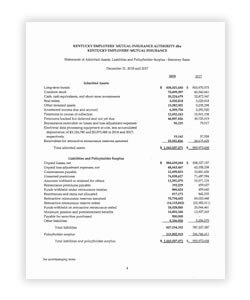Financials
Assessability
Mutual Insurance Companies
When the assets of a mutual insurance company are insufficient to cover its liabilities, and the deficiency cannot be cured from other sources, its directors may levy an assessment upon its policyholders (KRS 304.24-230). The policyholders of mutual insurance companies have a contingent liability, pro rata, for the liabilities of the mutual insurance company (KRS 304.24-220). This means that each policyholder is responsible for its proportional share of the liabilities. However, the assessment period for mutual insurance companies is limited to the prior twelve (12) months (KRS 304.24-230).
KEMI is a mutual insurance company and pursuant to KRS 342.823(5) its Board may levy an assessment if its assets are less than its liabilities in the manner provided in KRS Chapter 304 referenced above. However, due to KEMI’s financial strength, it is highly unlikely if not improbable that KEMI would ever need to issue an assessment. As of December 31, 2021, KEMI had over $310 million dollars in policyholder equity (assets minus liabilities). Additionally, KEMI has received an A- (Excellent) rating from A.M. Best, an independent financial rating agency, since 2001.
Self-Insured Group Funds
Conversely, the policyholders of self-insured group funds are jointly and severally liable for the liabilities of the fund. This means that each policyholder is responsible for the entire liability of the fund. When the assets of a self-insured group fund are insufficient to cover its liabilities, the self-insured group fund shall levy an assessment upon its members for the amount necessary to make up the deficiency. Furthermore, there is no limitation on how far back the assessment period can be.
Compare
| Self-Insured Group Funds | Mutual Insurance Companies | |
| Liability | Joint and Several | Contingent |
| Assessment Period | No limitation | 12 months |




